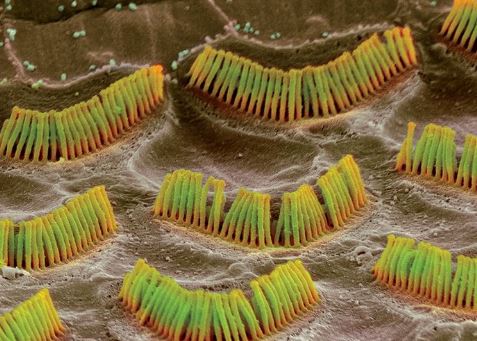Even though so-called disruptive technology, e.g, over-the-counter hearing aids, has been a big focus of the National Academy of Sciences recommendations to changes in hearing health care, other more futuristic innovations may hold sway in the treatment of hearing loss.
 Hair cell regeneration is one of these potential breakthroughs, and it is the cover story in the summer, 2016 issue of Acoustics Today, a publication of the Acoustical Society of America. The article, authored by Rebecca Lewis, Edwin Rubel and Jennifer Stone from the Virginia Merrill Bloedel Hearing Research Center at the University of Washington in Seattle, provided an update on hair cell regeneration and its potential use as a treatment for hearing loss.
Hair cell regeneration is one of these potential breakthroughs, and it is the cover story in the summer, 2016 issue of Acoustics Today, a publication of the Acoustical Society of America. The article, authored by Rebecca Lewis, Edwin Rubel and Jennifer Stone from the Virginia Merrill Bloedel Hearing Research Center at the University of Washington in Seattle, provided an update on hair cell regeneration and its potential use as a treatment for hearing loss.
Focusing on Strategy
After reviewing the underlying biomechanics of auditory hair cells, the authors focus on three general strategies researchers are using to coax supporting cells in the mature mammalian inner ear to regenerate hair cells.
The first research strategy involves evaluating the process of hair cell development in the organ of Corti during the embryonic period when these cells move through a complex series of steps controlled by an array of molecular activity. The second research strategy entails a systematic evaluation of how other tissues in the human body, such as skin, intestines and some parts of the brain regenerate, and how these other tissues could be co-opted to trigger hair cell regeneration in the cochlea. Finally, the third research strategy touches on the use of molecular genetics and how hair cell regeneration in birds and fish could be applied to the human cochlea.

Anatomy of the Organ of Corti. Courtesy Brittanica
The authors also provided an update on the use of stem cells and how these cells might one day be placed in the Organ of Corti where they could spur regrowth of hair cells.
According to the article, substantial progress toward hair cell regeneration in humans has been made since 1985, when researchers discovered it was possible to regenerate hair cell in vertebrates. However, several challenges, namely knowing how many of each type of hair cell – inner and outer -needs to be regrown to improve hearing, remain. Although clinicians are unlikely to use hair cell regeneration as a treatment within the next decade or more, research in this area remains promising.
*featured image courtesy newscientist








Hopeful that this will happen for the young people who have hearing loss. Too late for me but I have my cochlear implant miracles that allow me to hear quite well.
Very interesting. Unfortunately I was unable to download and read the full cover story article linked, despite following instructions to register at the Acoustics Today site.
Hi Robert,
Try this link: http://acousticstoday.org/regeneration-auditory-hair-cells-potential-treatment-hearing-loss-horizon-rebecca-m-lewis-edwin-w-rubel-jennifer-s-stone/
I hope hair cell regeneration occurs as soon as possible. I love my hearing aids with all the programs necessary for me to hear well. The telecoil must be installed automatically and properly my the manufacturer in each hearing aid sold. This allows me to use a cell phone with my hearing aids on the telecoil program. I also love the Pocketalker Ultra with a headset to watch the TV. People who are experiencing the invisible disability of hearing loss should visit an audiologist with an AuD and not a salesman selling hearing aids in a department store. If you are not sure where to find a licensed audiologist visit a university or hospital with an audiology department. Also log on to the Hearing Loss Association of American (HLAA) website.
Get evaluated to see if you are a candidate for cochlear implantation
I love mine. So happy that I went through with it.
Rob Gerks (stem cell recipient) clinical trial results will be available in 2017. Novartis invested 240 million into Genvec for Hair Cell Regeneration of the Cochlear and so far Rob (middle age) had some of his balance restored (early 2015) thus far.
This is very interesting. I was born profound deaf and have been wearing hearing aids all my life. I hope they develop some kind of solution for deafness.
Cochlear implantation! I got one and it gave me the ability to hear. Definitely improved my quality of life.
There are two critical factors to be considered:
1. Entry into the Organ of Corti will most likely disrupt ionic function permanently.
2. Planting a cell in the gap between two will alter the frequency/gap relationship, besides adding another possibility: the difficulty of implantation in the spiral ganglion of the characteristics of the new cell.
Sure they can keep trying. Step 1 would be to work inside the cochlea without damaging it !!!!!!!
Jay Muhury.
(562)433-6701